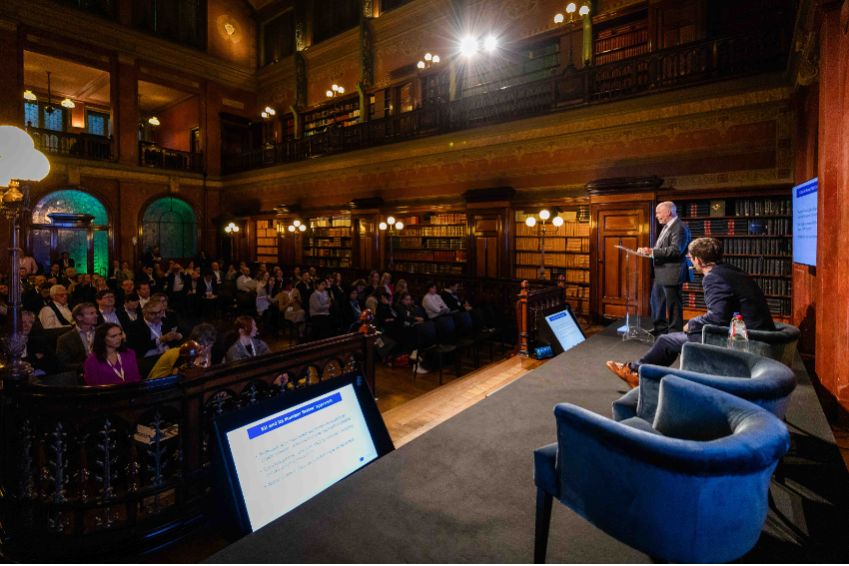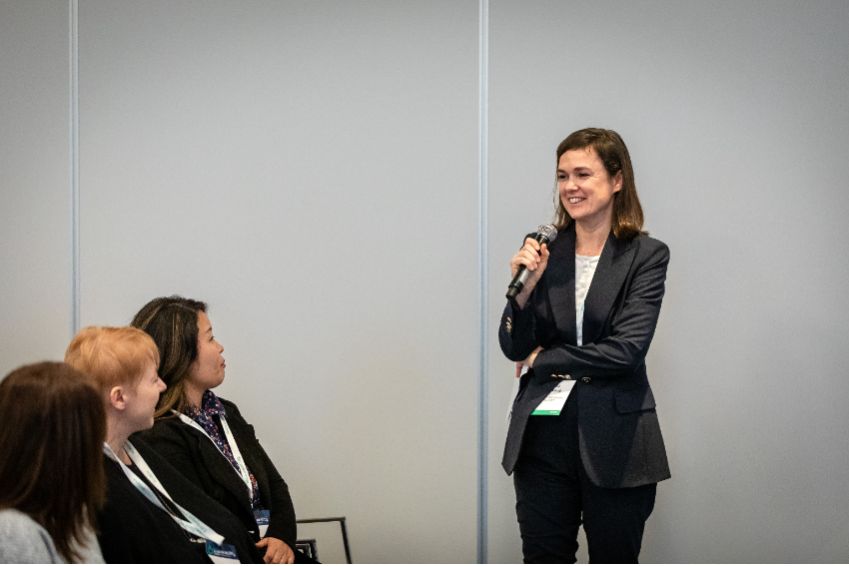You might not know much about nonwoven materials, however you will have seen them every day of your life. Before you’ve already got out of bed in the morning, you’ve used your nonwoven bed linen. Your morning cup of tea? The teabag is a nonwoven. Changing your baby’s nappy? That’s also a nonwoven. Nonwovens are innovative, high-tech, engineered fabrics made from fibres which are designed for their specific application.
Due to their centrality in consumer’s lives, these nonwovens must be affordable, safe, and most of all sustainable. How to ensure that nonwovens meet these criteria was at the forefront of discussions at EDANA’s recent Sustainability Forum, where high level industry stakeholders and policymakers came together to highlight the importance of sustainability for the nonwovens industry. EDANA is the global voice of nonwovens. The association aims to promote the sustainable development of the nonwovens industry for over 300 companies worldwide and advocates the benefits of nonwovens for society.
During the Forum, EDANA unveiled their new sustainability vision for the industry: “Our previous sustainability vision was developed in 2018, and in this constantly evolving space no longer reflected the improvements and investments that the nonwovens industry has made regarding environmental and societal aspects,” said Gil Stevens, EDANA’s External Relations & Sustainability Director.

The progression of manufacturing in the nonwovens industry is particularly remarkable. Celmira Sousa, Senior EU Public Affairs Manager at NatureWorks, provided the example of their product Ingeo. Ingeo is a biomaterial made from ethically sourced, annually renewable feedstocks. The material has a wide range of uses including in teabags, buildings and infiltration. Promisingly for Europe’s future, Ingeo has a 71% smaller carbon footprint than EU fossil based plastics and a 75% smaller carbon footprint compared to PET. Recognising their extreme potential as a replacement for plastics, President Biden has already set targets to replace 90% of fossil based plastics with biobased solutions over the next two decades in the US. In Europe, Commission President Ursula von der Leyen announced a new biotech initiative in her recent State of the Union speech, whilst the Council identified the bioeconomy as a priority for Europe’s competitiveness.
As they span several different product types, nonwovens are subject to regulation from across the policy spectrum. The European Commission’s programme on a circular economy and the green claims directive are therefore central areas of legislation to the workings of the nonwovens industry. Jana Hošková, Deputy Head of Unit DG for Justice and Consumers at the European Commission, explained that the desire to empower the consumer is central to these pieces of legislation. “If given the choice, consumers will often choose the more sustainable option. Therefore, consumers want to know how long a product will last and how it can be repaired” she told the summit.
“If given the choice, consumers will often choose the more sustainable option” - Jana Hošková, Deputy Head of Unit DG for Justice and Consumers at the European Commission
This transparency on product lifecycle is crucial due to some misleading business practices in Europe. Whilst some companies have made efforts to provide consumers with this information, Hošková revealed that in a 2020 survey the European Commission found that of 150 environmental claims for a wide range of products, over 50% were very misleading or unfounded. To combat these misleading claims, the new green claims directive will require companies to provide evidence of their claims from a third party or have them established by a public authority.
Aurel Ciobanu-Dordea, Director of DG Environment at the European Commission underlined the importance of the green claims directive during his keynote presentation, reminding the audience that “greenwashing has no room to exist on the single market of the European Union”. Those who are engaged in greenwashing are unfairly distorting competition in European markets and this was something he was eager for the legislation to stamp out in order to level the playing field for those businesses doing their bit to meet targets. This focus on green claims is a step in the right direction to empower Europe’s consumers.

How are these policy measures being put into action? Sofia Krigsma, Director of Public Affairs at Essity provided a perspective on how these measures are already being implemented by businesses. Essity, a manufacturer of several sanitary brands including Libresse and Tena, have long had a robust internal process for claims which appear on their product’s ecolabels. Their process begins with a sustainability assessment, then is followed by a lifecycle assessment according to ISO standards and is rounded off by a third party verification and an internal claims assessment. This process takes the company around two years to complete but they find this use of ecolabels on their products as the best way of communicating with their customers so the long assessment is justified. This added transparency to their processes and ecolabels is designed to help instil confidence in their consumers and build a relationship with the company and its trusted brands.
“Greenwashing has no room to exist on the single market of the European Union” - Aurel Ciobanu-Dordea, Director of DG Environment at the European Commission
Clara Carelli, PhD, Sustainability Director of Beaulieu International Group, spoke about how Europe should be proud of its progress in the area of nonwovens. “I think what Europe is doing today is great, we are leading the race” she told the audience. But she warned that there are still steps that can be undertaken to make understanding around sustainability and the green claims of nonwoven products easier for consumers to understand. At Beaulieu International Group, the company currently use 23 labels. This number is required to meet industry standards but adds a significant burden to their product ranges which could be simplified for consumers. In this process, transparency is crucial. “There is no sustainability without being completely transparent” Carelli reiterated.
What can be done to ensure a successful future for the nonwovens industry in Europe? ‘Trust’ was the important word in common from Sousa, Krigsma and Carelli. This future of trust must work both between policymakers and industry and importantly between industry and society. Consumers must be provided with transparent and accurate information as Europe strives towards a sustainable future. Listening to science was also highlighted as a way for Europe to continue to be leaders in the nonwovens industry. “Often we don’t look enough at science implications like with Packaging and Packaging Waste Regulation. We need to set the pace with science”, Carelli argued.
“I think what Europe is doing today is great, we are leading the race” - Clara Carelli, PhD, Sustainability Director of Beaulieu International Group
No matter what is done in the future of the nonwovens industry, EDANA’s External Relations & Sustainability Director Gil Stevens reiterated the importance for future nonwoven products to remain grounded in science and be safe for consumers to continue to use in their everyday lives. With the push for product sustainability central to Europe’s push towards sustainability, nonwovens promise to play a pivotal role.
Sign up to The Parliament's weekly newsletter
Every Friday our editorial team goes behind the headlines to offer insight and analysis on the key stories driving the EU agenda. Subscribe for free here.